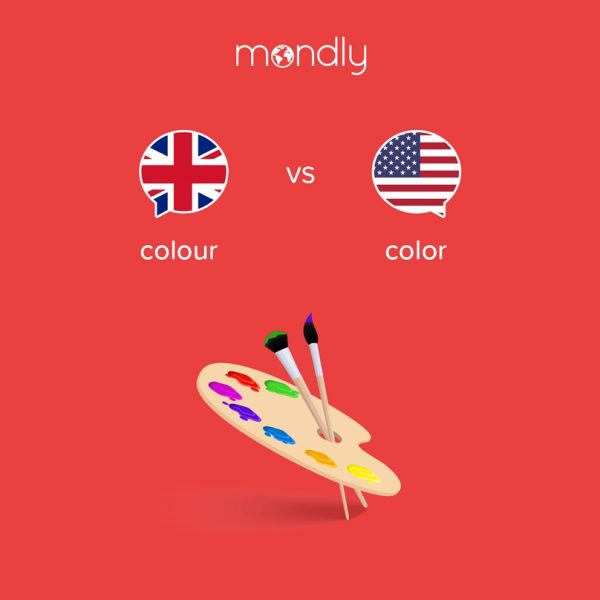
US & UK English Discrepancies

US & UK English Discrepancies
British vs American: the ultimate language battle. The same, but different. But how different after all? Bernard Shaw, Irish playwright and political activist, famously said that The United States and Great Britain are“two countries divided by a common language” . Still, Brits and Americans always had this ongoing “fight” about “which English is best?” or “who speaks proper English?”. This is, of course, a joke_(or is it? hehe)_ . After all, British English and American English are not entirely different languages.
As someone speaking British English you’ll probably have (close to) no problem understanding American English and vice versa. But there are indeed rather important questions about the existing differences between the two “languages”. How did the same language develop in such a different way? Why do we spell some words differently? “Soccer”/“football”, “sweater”/“jumper”, “sneakers”/“trainers”, “eraser”/“rubber”, “mail/post” are just a few of the troubling duos that first come to mind.
Before we go on… you’ve just realized, didn’t you? The “sweater weather” is actually the “jumper weather” or the “pullover weather” in the UK. Oh my God, this can’t be right, is it?

The English language in the Americas
Before diving into the most important differences between British English and American English, let’s put some historical context around the matter.
As you probably already know,the English language was first introduced to the Americas in the 16th and 17th centuries by the British colonists. Over the next 400 years, the English used in the region we now know as the United States welcomed some changes. However, these were not standardized until 1828, when Noah Webster published the first American dictionary . Allegedly, he changed the spelling of some words to make American English different from British English as a way of showing cultural independence.
Differences between American English and British English may be observed in pronunciation (Brits soften the pronunciation of the “R” sound while Americans pronounce it completely), vocabulary, grammar, spelling, punctuation, and even idioms. Additionally, Americans also chose to use different formatting for dates and numbers.
Let’s dive into a little more detail and analyze each point of differentiation.
British vs American: most common vocabulary differences
Although the accent represents the most noticeable difference between British and American English, there are also words that differ completely depending on whether you are in Europe or across the Atlantic ocean. For example, as already mentioned, what Americans call a “sweater” is known as “jumper” or “pullover” in the United Kingdom. In the same fashion, what is known as football across the European continent Americans call soccer.
And that’s not everything. There’s actually a very interesting story behind the use of “football” and “soccer”. Althoughthe term “soccer” was born in Britain some 200 years ago , Americans began using it to distinguish European football from American football. Then, in the ‘80, Brits began using “soccer” less and less because it had become too “American”.
Here are the most important vocabulary differences between British and American English:
Show 10 25 50 100 entries
Search:
| British English | American English |
|---|---|
| trainers | sneakers |
| trousers | pants |
| flat | apartment |
| jumper/pullover | sweater |
| braces | suspenders |
| bonnet | hood |
| boot | trunk |
| waistcoat | vest |
| university | college |
| holiday | vacation |
Showing 1 to 10 of 40 entries
Previous Next
Spellings differences: is it “colour” or “color”?
That’s simple! “Colour” is the British spelling and “color” is the American spelling. Always remember that, when it comes to spelling, American English uses a simplified version. The explanation goes back to 1828 when Noah Webster wrote the first American dictionary –An American Dictionary of the English Language. Webster said he chose alternative spellings that were already in use in the United States “on such grounds as simplicity, analogy or etymology”.
Here are the most common spelling differences between American and British English:
Show 10 25 50 100 entries
Search:
| British English | American English |
|---|---|
| -ise (familiarise, recognise) | -ize (familiarize, recognize) |
| -ou (colour, humour) | -o (color, humor) |
| -re (metre, theatre) | -re (meter, theater) |
| -l- (skilful, fulfil) | -ll- (skillfull, fulfill) |
| -oe-/-ae- (oestrogen, encyclopaedia) | -e- (estrogen, encyclopedia) |
| -ence (offence, pretence) | -ense (offense, pretense) |
| -ogue (analogue, catalogue) | -og (analog, catalog) |
| -ell- (cancelled, marvellous) | -el- (canceled, marvelous) |
| -y- (tyre) | -i- (tire) |
Showing 1 to 9 of 9 entries
Previous Next
If you speak English as a second language and you are not sure which is the correct spelling for the type of English you use, install a spell checker and let it do the job for you. In time, you’ll get used to the fitting spelling and learn to write correctly on your own.
Grammar differences
Although spelling, accent, and vocabulary differences are the most notorious distinctions, American English and British English are divergent in some grammar matters as well.
Collective nouns
In American English, collective nouns such as “band”, “team”, “family” or “crew” are considered plural. In contrast, British English considers collective nouns either singular or plural, but more often plural as a way to emphasize the members of the group.
Thus, while“The band is playing” in the US, in the UK“The band are playing” . Likewise, if I’m in the US,“My team is winning” . But if I’m in the UK,“My team are winning” .
Learned or learnt?
Learned andlearnt are both the correct past participle and past tense forms of the verb “to learn”. Easily overlooked in speech, but much more obvious in writing, this subtle difference addresses verbs.
Many verbs that are irregular in the past tense in British English (dreamt, burnt, learnt), have been made regular in American English (dreamed, burned, learned).
Got or gotten?
In the UK, the past participle of “get” – “gotten” – is considered archaic and was replaced with “got” some time ago. Americans, on the other hand, still use “gotten” as the past participle of “get”.
British English: get – got – got
American English: get – got – gotten
Tenses
While Brits tend to use the present perfect tense to describe something that has recently occurred, Americans usually go with the past simple tense.
Thus, in Britain, you’ll say“I’ve been to the supermarket” and in the US you’ll say“I went to the supermarket” .
Prepositions
In British English, “at” is generally used in relation to time and place. In contrast, in American English, “on” is used in relation to time and “in” is used in relation to place.

British English vs American English
Other grammar differences
Generally, the British are more likely to use formal speech, while Americans will rather go with informal expressions. For instance, Brits will use “shall” where Americans use “will” or “should”.
Additionally, in Britain, you are likely to hear “needn’t” a lot and in the US not at all. In its place, Americans use “don’t need to”.
British accent vs American accent
The biggest difference between British English and American English is, undoubtedly, the accent. The reason why these two variations sound so different is known as rhotacism, the change of a particular consonant into a rhotic consonant. In this case, the consonant is “r”.
American accent is rhotic and Americans pronounce their “R’s” loud and clear. On the other hand, the British accent is non-rhotic and Brits usually replace their “R’s” with “H’s”. Thus, words like “water” or “card” will be pronounced_wa-tuh_ or_caahd_ .
British vs American: which one should you learn and use?
It doesn’t matter whether you learn British English or American English. There is no such thing as “the best English”. Learn whichever you feel and like. Of course, if you intend to move to the United States, it is best to study and get used to the American accent.
The most important thing you should remember is to be consistent. Once you decide to go with British English, go with British all the way through. Avoid mixing them up. And work hard on your desired English pronunciation .
Then again, the truth is that these two English variants are very much alike. In fact, the written forms of American and British English you’ll find in textbooks and newspapers vary quite little in their essential features. Besides, even if they don’t like to admit it, American English has influenced British English via pop culture, and vice versa. It is what it is.
We haven’t discussed at all the funnier brother of these two variants: Australian English. If you want to learn some of its funniest slang, check out 87 Australian slang terms to help you speak like a true Aussie.
Brush up your English in just 10 minutes a day
Do you want to speak English like a true American? Or maybe you dream of acquiring the classy British accent? With Mondly you can train for both.
It can be really tricky to master the desired English accent if you don’t actively practice speaking with fluent people. But with Mondly, you’ll have access to a unique, fast and highly efficient learning method that allows you to learn British English or American English naturally with practical topics, authentic conversations and bite-sized Daily Lessons.
Start using Mondly for free on your computer or download the app and learn British English or American English fast anytime, anywhere.
Also read:
- [New] In 2024, Optimizing Visual Experience Enabling Auto HDR on Windows 11
- [Updated] Building Effective Product-Sponsor Relationships for 2024
- Can I recover my data if my iPhone 8 Plus screen turns black? | Stellar
- Guide Complet Pour La Fabrication D'une Clé USB De Démarrage Avec Windows 11
- How To Bypass Vivo S17e FRP In 3 Different Ways
- In 2024, Preventing Motion Sickness in Virtual Worlds
- Mandatory Syntax or Flexible Communication?
- Project Protection Learn How to Save Your Final Cut Pro Files
- Revolutionize Your AI Dialogues, Powered by Google Chrome!
- Starting Arabic Mastery: Easy Steps
- Time Invested in Language Acquisition vs Outcomes
- Understanding Basic French Phonetic Patterns as Beginners
- Unlock Smooth Motion Capture on iOS/Android Free Slow Video Apps Review
- Title: US & UK English Discrepancies
- Author: Christopher
- Created at : 2025-01-15 16:51:29
- Updated at : 2025-01-22 16:42:06
- Link: https://mondly-stories.techidaily.com/us-and-uk-english-discrepancies/
- License: This work is licensed under CC BY-NC-SA 4.0.